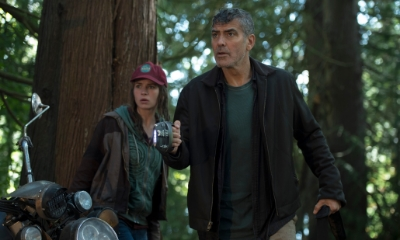Pop Culture Musings: Tomorrowland is Not What You Think
The early rap on Tomorrowland, a beat that starting thumping before the film had hit theatres, was that it was a film in praise of some kind of Objectivism. Objectivism is, if you do not know, the sociopolitical philosophical movement that was perhaps most famously championed by Ayn Rand and 14 year olds everywhere.
It argues, in essence, that the best and brightest amongst us should, essentially, be freed of the constraints of the mundane. They should not be required to engage in doing things for the well-being of the non-elites like pay taxes or share their incredible inventions because the others—be they the poor, dumb, or, most often, the government—will inevitably squander and ruin such things.
The thing is, though, Tomorrowland actually presents the opposite argument.
Whoa, whoa, whoa. Here me out, Frank. (photo from theguardian.com)
In it, indeed, the elites do go off and establish Tomorrowland as a haven for the greatest minds to come and invent in a world free of bureaucracy and regulation. However, from the start, the pitch of the place is that then these brilliant ideas and inventions will be used to benefit the world at large. That safest car ever developed? It will not stay in Tomorrowland, it will be manufactured and made available to the larger world.
Still one could argue that the stated intent of a place does not actually equal the place’s true intent. It is certainly possible, to paraphrase Shakespeare, to smile and smile and be an elitist society with no intent of sharing.
And the movie certainly implies that is the case. George Clooney’s Frank Walker is sent off as a child, banned for life. None of the inventions trickle down, if you will, to us average folk. Tomorrowland seems to be the isolated elitist haven critics had their knives out for.
That is until we see it. Dark and dingy instead of bright and shiny. Crumbling infrastructure. The implications of a police state with almost no population to be policed. If this is what we get when we isolate elites, well, that approach does not seem quite right, does it?
The film only makes it seem worse when we learn why Frank was sent away. The elites hid terrifying news from the world at large and then wiled away decades not really doing anything to intercede. Then, even as the doomsday clock marches to zero, still the elites stay silent. And this is not portrayed as for the greater good, despite Hugh Laurie’s Nix’s speechifying. It is clear Tomorrowland did wrong and continues to do wrong until the bitter end.
Tomorrowland, it turns out, is no utopia providing for the world. It isn’t even an isolationist utopia providing only for the best and brightest. Instead it is a near wasteland, inhabited by only a few holdouts, holdouts who’d rather watch the world burn then help those lesser than them. It is, in fact, every liberal’s perspective on Ayn Rand’s teachings. Self-appointed elites who cannot manage the day to day enough to keep their lives from utter disrepair who would choose the destruction of earth over helping their fellow man.
I don’t know what Brad Bird’s politics are or if he is an avowed Objectivist. But I can tell you he made a movie that is anti-Objectivist, not a propaganda reel for it.
Oh no! Don't tell me you're going to be weird about us too. (photo from collider.com)
Related/Unrelated Last Moment Digression: The relationship between the robot girl Casey and Clooney’s Frank is not creepy. Or, it doesn’t have to be read that way. Yes, Frank loves her still and she, insofar as she can, appears to love him. However, there are different kinds of love and most of them do not involve lust or sex.
There is never any indication in the movie—blatant, subtle or SUPER SUBTLE—that Frank wants to get with Casey or has any kind of sexualized attraction for him. He loves her, but he’s not infatuated with her.
To put it a different way, you can look back now on photographs of a crush from, say, 7th grade and remember how you felt about him or her. And, in that nostalgic way, perhaps you can re-experience that crush. But you are not staring at that picture of a 12 year old and feeling the same kind of libidinous desires for the crush that your 12 year old self did. You can still feel a connection to that time, to that person, as an adult, as someone 20 or 30 years removed from that moment, and it be normal and not creepy or inappropriate. Similarly, if that 12 year old somehow came to life in that moment, you might well feel warm feelings for that crush of yesteryear. You might even want to look out for or protect them and be distraught if something happened to them. But that wouldn’t mean you wanted to make out with them.
In the end, there is nothing on the screen that indicates Frank’s feelings for Casey, his first love, effectively, are anything more than the kick of nostalgia and a love that did not have a chance to grow or be grown out of. Saying it is creepy is way more about what the viewer is bringing to it then what the action indicates.

